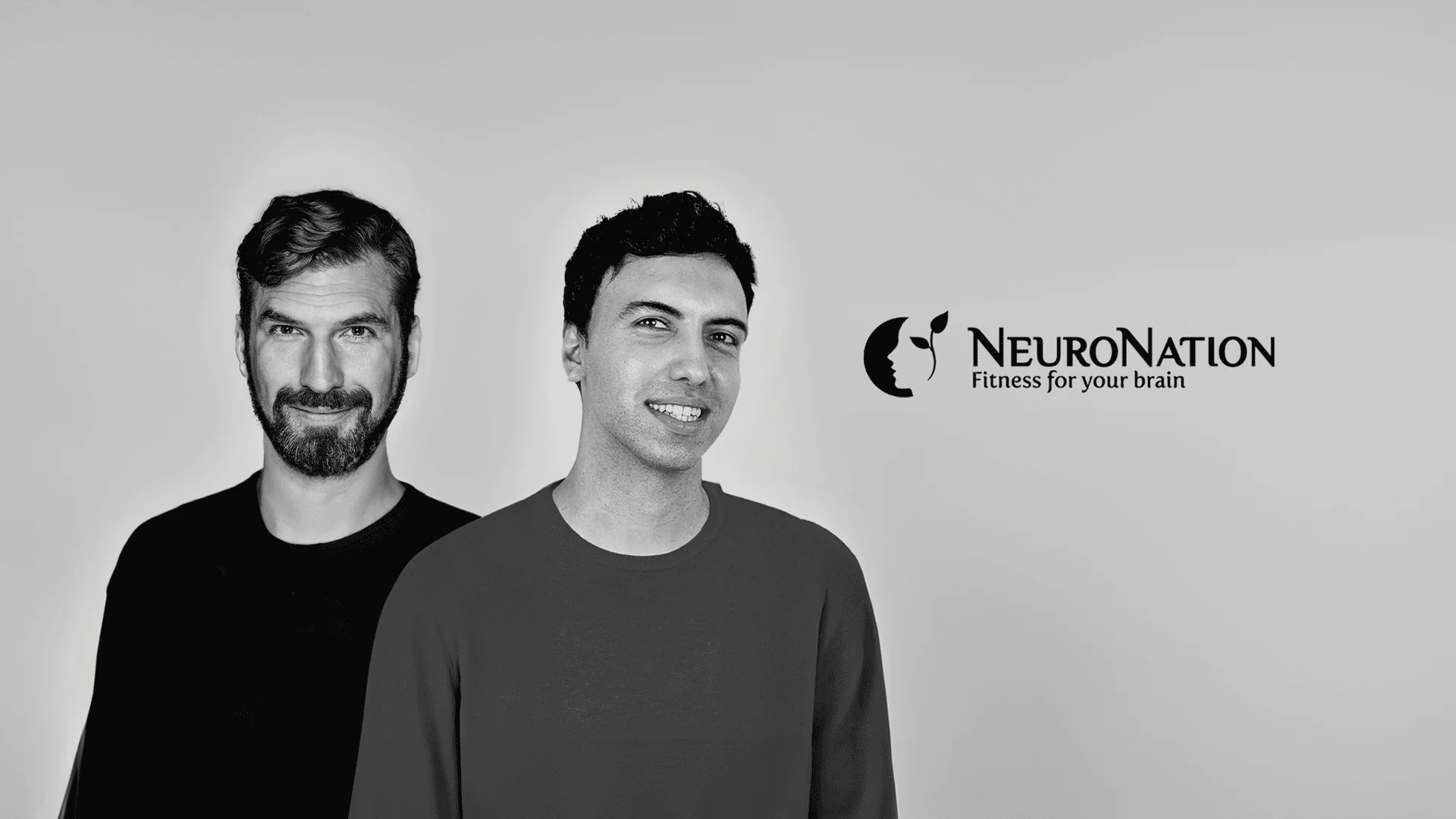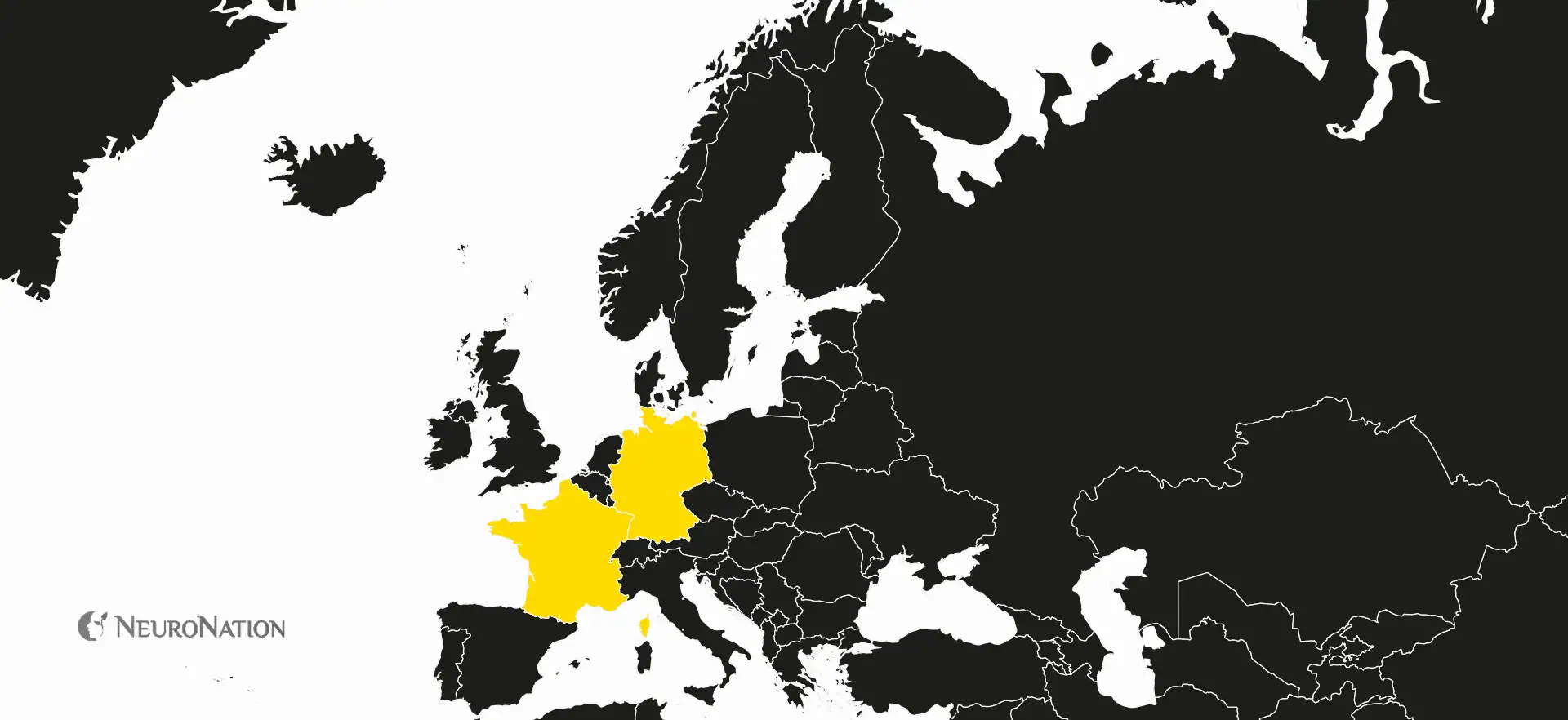« Nous avons réalisé que les jeux vidéo pouvaient changer la vie des personnes souffrant de troubles cognitifs légers et améliorer considérablement leur vie quotidienne. »
Jakob Futorjanski et Rojahn Ahmadi
« Nous venons tous les deux de mondes très différents. »
Nous avons des parcours professionnels très différents. J’ai une formation en systèmes d’information et en finance, tandis que Rojahn vient du monde de l’intelligence artificielle et des jeux. Au départ, nos métiers n’avaient pas d’impact concret sur la société. Mais au fil des années, nous avons réalisé que nous pouvions faire plus pour le monde. Durant cette période, j’ai senti que j’étais à un point critique de ma vie professionnelle. Je me suis demandé : « Quelle différence cela fait-il de chercher à améliorer d’un point de base le rendement d’une banque grâce à une optimisation algorithmique ? » Si mon travail ne fait pas de différence pour notre communauté, à quoi bon ? J’ai donc décidé de changer de direction.
Une formation cognitive personnalisée ?
Une coïncidence en appelant une autre, nous nous sommes retrouvés à travailler avec un psychologue expérimental avec l’objectif de mener une étude sur l’utilisation de « jeux » d’entraînement cérébral pour améliorer les fonctions cognitives de personnes souffrant de déficiences acquises ou neurodégénératives. Le problème était que les exercices cognitifs traditionnels, manuels et non numériques, n’étaient pas suffisamment attrayants pour motiver les gens à les utiliser régulièrement. Nous avons donc tenté de résoudre ce problème en utilisant des exercices ludiques.
Et si la solution venait des jeux vidéo ?
Des études sur l’impact des jeux vidéo sur les capacités cognitives ont semblé confirmer notre intuition : les personnes ayant utilisé l’entraînement NeuroNation ont obtenu des résultats supérieurs de 20 % à ceux des personnes ne l’ayant pas utilisé. Notre idée de départ a donc été validée, mais il fallait encore trouver un moyen de la rendre accessible au grand public. En 2011, nous avons donc lancé NeuroNation, une plateforme Web de jeux d’entraînement cognitif. NeuroNation est une application d’entraînement cognitif personnalisé disponible sur tous les magasins d’applications et sur notre site Web. Au début, l’entreprise s’est efforcée de trouver un modèle économique viable. Nous avons essayé la publicité, les paiements uniques et la monnaie virtuelle, mais rien n’a fonctionné. En 2013, l’entreprise a adopté un modèle freemium avec abonnement. Les utilisateurs peuvent télécharger l’application gratuitement, mais doivent payer un abonnement mensuel pour débloquer tous les jeux. Ce modèle a permis à l’entreprise de se stabiliser financièrement.
Notre objectif initial a toujours été de faire reconnaître notre application comme un produit médical, ce qui lui permettrait d’être remboursée par les caisses d’assurance maladie et donc accessible gratuitement à tous les patients.
Il ne manquait plus qu’un déclic. En 2014, nous avons commencé à investir le marché du développement personnel, en proposant notamment l’application aux entreprises. Cela nous a permis d’augmenter notre base d’utilisateurs et nos revenus. Peu après, une étude scientifique a été publiée en Allemagne, confirmant l’efficacité de NeuroNation dans l’amélioration des capacités cognitives. Cette étude a marqué une étape-clé pour nous : lancer le développement d’un produit purement médical. Aujourd’hui, la version freemium de NeuroNation compte vingt-sept millions d’utilisateurs dans plus de cent cinquante pays.
En 2023, nous avons réussi à obtenir une reconnaissance auprès du ministère allemand de la Santé ; notre produit médical peut être prescrit par les médecins et remboursé par toutes les assurances maladie en Allemagne et plus de trois mille professionnels de santé prescrivent déjà l’application de santé numérique.
Un triple impact dans l’accompagnement des malades..
Le premier est évident : nous améliorons la santé des personnes atteintes de déficience neurologique grâce à la technologie numérique, en leur évitant ainsi d’utiliser des médicaments aux effets secondaires souvent néfastes. Le deuxième, prouvé par l’étude australienne « Maintain your Brain », est le suivant : nous réduisons le déclin cognitif dans le cadre d’une approche holistique de la vie quotidienne, contribuant ainsi à retarder l’apparition de la maladie d’Alzheimer et de la dégénérescence neurologique en général. Enfin, en permettant aux patients de rester indépendants chez eux, notre application réduit la sur-utilisation des soignants, soit moins de pression sur les hôpitaux tout en luttant efficacement contre les maladies aux effets durables telles que le post/long Covid.
Impact Partners nous a apporté un soutien stratégique dans notre développement. Ils nous ont présentés au directeur de l’innovation de l’Institut du cerveau, avec qui nous sommes en discussion active pour continuer à développer notre solution, ainsi qu’à des personnes-clés en Europe, notamment au sein de systèmes de sécurité sociale. Grâce à ces contacts, nous avons pu avancer dans notre objectif de demander le remboursement de nos prestations auprès des organismes de sécurité sociale. Sur le plan stratégique, ils nous ont aidés à réfléchir à nos priorités et à identifier les meilleures opportunités de croissance.
Enfin, Impact Partners est le seul fonds d’investissement qui nous demande de mesurer l’impact de notre solution sur les utilisateurs et les patients. Nous avons donc un indicateur-clé de performance (KPI) qui mesure le nombre de vies améliorées chaque mois et qui nous rappelle pourquoi nous avons pris tant de risques et pourquoi nous travaillons.
Pour Impact Partners, la performance sociale est aussi importante que la performance financière.
Sans impact, nous n’avons pas de marché. Avec NeuroNation, nous nous concentrons sur une niche spécifique. Mais il existe de nombreuses autres niches d’impact, et tout le monde peut s’engager dans des activités économiquement et socialement bénéfiques. À l’avenir, nous voulons nous développer pour lutter contre le vieillissement psychique de la population.
Les pays de l’Union européenne doivent s’acculturer pour tirer pleinement parti du potentiel des nouvelles technologies neuroscientifiques.
La population européenne vieillit et a besoin de solutions pour améliorer et maintenir ses capacités cognitives. Cependant, il existe une certaine réticence à utiliser les technologies numériques, notamment dans les pays où ces outils sont moins connus. De plus, dans l’Union européenne, la santé est un domaine encore peu numérisé, avec de grandes disparités entre les pays. Il est donc nécessaire d’éduquer les Européens aux bénéfices des nouvelles technologies des neurosciences. De plus, nous avons dû adapter notre application aux cultures des différents pays dans lesquels nous nous sommes implantés. Cela a nécessité des changements au niveau des visuels, de l’interface et du modèle commercial. Il est important de comprendre que la façon dont les applications sont utilisées varie d’une culture à l’autre.


